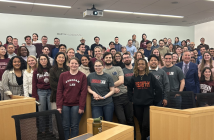Two Fordham professors who have written extensively on immigration matters shared insights and addressed misconceptions associated with the politically divisive issue during a timely installment of the Maloney Library’s Behind the Book series on Sept. 20.
Fordham Law Professor Jennifer Gordon and Christina Greer, Ph.D., associate professor of political science, discussed a multitude of issues during the hour-long conversation, including the importance of language in the context of the immigration debate, the role of sanctuary cities in today’s America, the fallacy of portraying some immigrants as good and others as bad, and how each of their ideas has evolved since their books were published.
The program, titled “Immigration Nation: Identity & Labor in American Politics,” also highlighted the ways the Trump administration in its first eight months has targeted immigrants, whether through increased Immigration and Customs Enforcement (ICE) arrests, ending Deferred Action for Childhood Arrivals, or the various iterations of the travel ban.
The professors noted that in the xenophobic atmosphere that President Trump has created immigrants are increasingly targets of attack. “The racism and xenophobia inherent in the [Trump] policies, combined with the new permission to speak in ways that are racist and xenophobic, make life very hard for immigrants,” said Gordon, author of Suburban Sweatshops: The Fight for Immigrant Rights (Belknap/Harvard University Press, 2005).
These factors make it harder for low-wage immigrant workers to defend their rights through worker centers, noted Gordon, who founded and ran the Workplace Project, a nonprofit labor rights center, from 1992 to 1998. However, the model is still “urgently necessary,” Gordon said, because it allows workers to use their collective strength to fight for improved work conditions and pay, organize community education, and devise legal strategies.
Trump’s appointment of then-Alabama Senator Jeff Sessions as attorney general sent a clear message of intent with regard to the administration’s hostility toward immigrants and its “maintenance of whiteness,” said Greer, the author of Black Ethnics: Race, Immigration, and the Pursuit of the American Dream (Oxford University Press, 2013). The Trump administration’s hardline immigration stances—and the potential for encounters with ICE agents— have inspired fear among many communities, leading people to keep their children home from school, families to stop attending church, and women who are victims of domestic violence to avoid the police, Greer told the standing room–only audience of students and faculty.
The Trump administration’s rhetoric is also having an adverse effect on local law enforcement’s relationship with communities. Greer cited St. Louis police officers chanting “Whose streets? Our streets” during a protest earlier this month as one prominent example of this development.
“That’s a really clear indication to not just marginalized communities but especially immigrant communities that they’re not welcome here,” Greer said, noting this message emanates from the White House.
In this political environment, the words that people use to describe immigrants are telling, the professors agreed. A person is not “an illegal” because they have violated an immigration law, any more than they would be if they ran a red light, Gordon noted. She added that the use of the term “alien” makes it easier to conceive of immigrants as “not fully human” and therefore deny that they should have rights.
“The low-wage labor market of the United States is dependent on undocumented immigrants, and to me that makes it a much more complicated question than who follows the rules and who doesn’t,” Gordon explained.
“Not only are you asking people to clean the house and mow the lawn but the sign on the door says, ‘We’re a nation of immigrants, please if you’re tired and hungry and poor, come on in,’” Greer added, expanding on a metaphor Gordon used to pinpoint the oftentimes hypocritical nature of U.S. immigration policy.
Lost in the public discourse about immigration is the fact that most undocumented immigrants have overstayed visas after being legally admitted, rather than crossing the border without authorization. The largest group of people who have overstayed visas are from Europe. This refutes assertions that Trump has made that undocumented immigration from Mexico is the principal problem and justifies the need for a border wall along the southern United States.
How sanctuary cities will protect their residents at risk of deportation remains an open question. Cities and states do not possess the power to grant immigration status or prevent deportation, but they can refuse to hand over non-citizens to ICE after criminal accusation or conviction, Gordon said.
Victor L. Essien, international law librarian at the Maloney Library and adjunct law professor, moderated the event.
The Behind the Book series, sponsored by the Maloney Library, serves as a bridge between the Fordham University academic community and Fordham Law School, fosters dialogue between people with different ideas, and provides background on the writing and publishing process. Previous installments have highlighted debates surrounding the Second Amendment and the media and politics.
—Ray Legendre


